新PEP小学英语六年级上册复习资料
新人教版(PEP)小学英语六年级上册各单元知识点总结

人教版(PEP)小学英语六年级上册单元知识点Unit1 How can I get there ?一、主要单词:museum博物馆bookstore书店cinema电影院turn 转弯left向左right向右hospital医院post office 邮局science科学straight笔直地crossing十字路口二、习惯语搭配:post office邮局science museum科学博物馆pet hospital宠物医院Italian restaurant意大利餐馆Beihai Park北海公园Palace Museum故宫博物院go straight直走turn right/left右/左转next to挨着in front of...在...前面near the park在公园附近on Dongfang Street在东方大街上三、惯用表达式:Excuse me 打扰一下Follow me, please!请跟着我!四、公式化句型:1、问路的句型及其答语:问句:Where is the + 地点?···在哪儿?2、询问怎么到某地的句型及其答语:问句:How can +主语+ get (to)+地点?···怎么到···?同义句型:Can you tell me the way to +地点?Where is + 地点?Which is the way to +地点?五、例句:Where is the cinema, please? 请问电影院在哪里?It’s next to the hospital. 它与医院相邻。
Turn left at the cinema, then go straight. It’s on the left. 在电影院向左转,然后直行。
它在左边。
Turn left at the bank。
PEP六年级上册英语复习资料大全
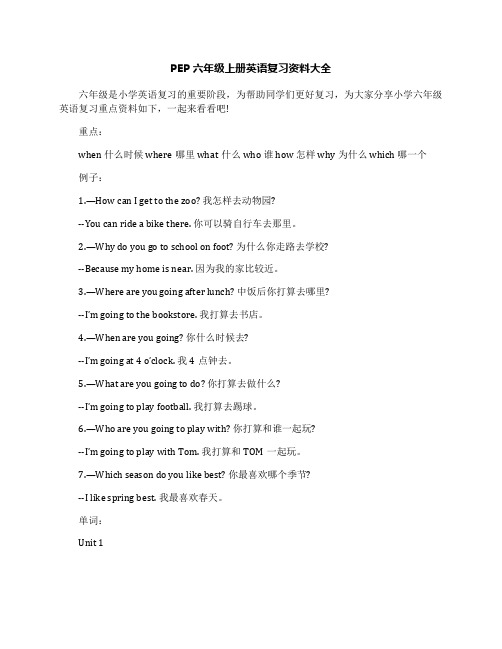
PEP六年级上册英语复习资料大全六年级是小学英语复习的重要阶段,为帮助同学们更好复习,为大家分享小学六年级英语复习重点资料如下,一起来看看吧!重点:when 什么时候 where哪里 what什么 who 谁 how 怎样 why 为什么 which 哪一个例子:1.—How can I get to the zoo? 我怎样去动物园?--You can ride a bike there. 你可以骑自行车去那里。
2.—Why do you go to school on foot? 为什么你走路去学校?--Because my home is near. 因为我的家比较近。
3.—Where are you going after lunch? 中饭后你打算去哪里?--I’m going to the bookstore. 我打算去书店。
4.—When are you going? 你什么时候去?--I’m going at 4 o’clock. 我4点钟去。
5.—What are you going to do? 你打算去做什么?--I’m going to play football. 我打算去踢球。
6.—Who are you going to play with? 你打算和谁一起玩?--I’m going to play with Tom. 我打算和TOM一起玩。
7.—Which season do you like best? 你最喜欢哪个季节?--I like spring best. 我最喜欢春天。
单词:Unit 1on foot(走路) by bike(骑自行车) by bus(乘公共汽车) by train(乘火车) by plane乘飞机 by ship乘轮船 by subway乘地铁 how(怎样) go to school(上学) traffic(交通) traffic light(交通灯) traffic rule(交通规则)bus stop(停车站) wait(等待) stop 停 get to(到达)Unit 2library(图书馆) post office(邮局) hospital(医院) cinema(电影院) bookstore(书店) science museum科学博物馆 supermarket超级市场 bank 银行 excuse me 对不起where(在哪里,到哪里) please(请) next to(与…相邻) turn right (向右转) turn left(向左转) go straight(笔直走) north 北 south 南 east 东 west 西 then (然后)Unit 3today 今天 tomorrow明天 tonight今晚 weekend 周末 next week(下周) this morning(今天上午) this afternoon(今天下午) this evening (今天晚上) take a trip去旅行read a magazine读杂志 go to the cinema 去电影院 visit grandparents看望祖父母 play sports 做运动 read books读书 clean my room 打扫房间 theme park 主题公园 the Great Wall 长城 comic book(漫画书) post card(明信片) newspaper(报纸) magazine杂志dictionary字典 buy(购买)Unit 4hobby(爱好) ride --riding a bike(骑自行车) dive--diving(跳水) play —playing the violin(拉小提琴) make—making kites(制作风筝) collect—collecting stamps(集邮) live –lives(居住) teach--teaches(教) go--goes(去) watch--watches(看) read--reads(读,看)Unit 5singer(歌唱家,歌手) writer(作家) actor(男演员) actress(女演员) artist(画家) TV reporter(电视台记者) student学生 teacher 教师 dancer 舞者 doctor 医生 nurse护士driver司机 farmer农民 engineer(工程师) accountant(会计) policeman(男警察) salesperson(销售员) cleaner(清洁工) work(工作)Unit 6rain(雨) cloud (云) sun(太阳) stream(河,溪) vapour水蒸气 come from(来自,从…来) seed(种子) soil(土壤) sprout (苗,芽) plant(植物,种植)句子:1.--How do you go to school? 你怎样去学校的?--My home is near. Usually I go to school on foot. Sometimes I go by bike.我的家很近。
最新人教版PEP小学英语六年级上册复习要点
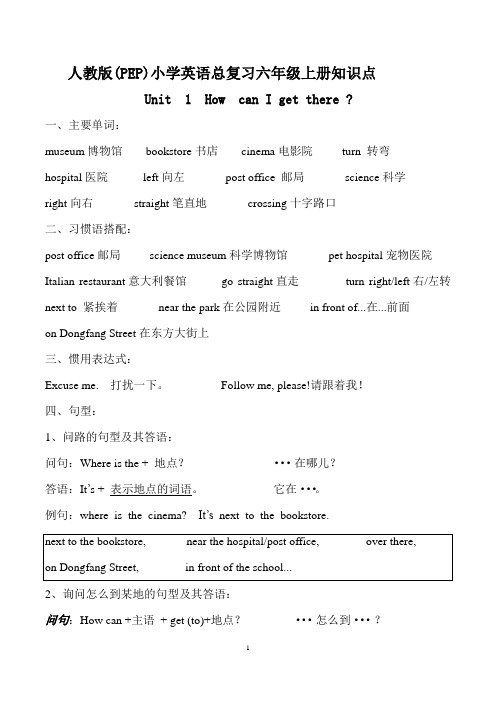
人教版(PEP)小学英语总复习六年级上册知识点Unit 1 How can I get there ?一、主要单词:museum博物馆bookstore书店cinema电影院turn 转弯hospital医院left向左post office 邮局science科学right向右straight笔直地crossing十字路口二、习惯语搭配:post office邮局science museum科学博物馆pet hospital宠物医院Italian restaurant意大利餐馆go straight直走turn right/left右/左转next to 紧挨着near the park在公园附近in front of...在...前面on Dongfang Street在东方大街上三、惯用表达式:Excuse me. 打扰一下。
Follow me, please!请跟着我!四、句型:1、问路的句型及其答语:问句:Where is the + 地点?···在哪儿?答语:It’s + 表示地点的词语。
它在···。
例句:where is the cinema? It’s next to the bookstore.next to the bookstore, near the hospital/post office, over there,on Dongfang Street, in front of the school...2、询问怎么到某地的句型及其答语:问句:How can +主语+ get (to)+地点?···怎么到···?例句:How can I get to ZhongShan park? How can I get there?同义句型:Can you tell me the way to +地点?Where is + 地点?Which is the way to +地点?答语:Turn +方向(left/right)+表示地点的介词短语。
新人教版PEP小学英语六年级总复习资料(全册)

新人教版PEP小学英语六年级总复习资料(全册)New n PEP Primary School English Grade 6 Review MaterialsI。
Antonymsbig --- smallblack --- XXXfree --- busyhot --- XXXsame --- differentcool --- warmtall --- shortlong --- shortyoung --- oldhere --- therebefore --- afternew --- oldII。
Word n1.CountriesChina。
America。
Australia。
Japan。
England。
Canada。
France2.nalitiesChinese。
American。
Australian。
Japanese。
English。
Canadian。
FrenchnguagesChinese。
Japanese。
English。
French4.SubjectsChinese。
Maths。
English。
Art。
Music。
P.E。
History。
Science5.Days of the WeekSunday。
Monday。
XXX。
XXX。
XXX。
Friday。
Saturday6.SeasonsSpring。
Summer。
XXX。
Winter7.MonthsJanuary。
February。
March。
April。
May。
June。
July。
August。
September。
October。
November。
XXX8.FestivalsSpring Festival。
Dragon Boat Festival。
Mid-Autumn Festival。
New Year's Day。
nal Day。
Children's Day。
Easter。
Halloween。
Christmas.1.植物和水果在我们的生活中,植物和水果是不可或缺的。
Pep 新版 六年级上册 小学英语 背诵资料集
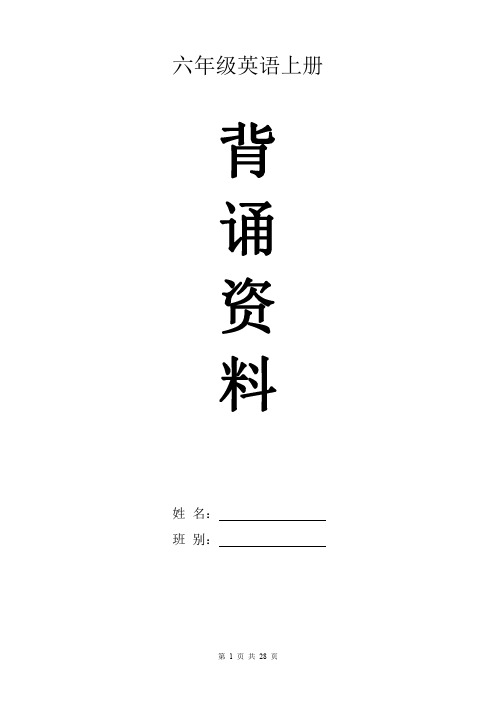
tomato(西红柿)--tomatoes potato(土豆)--potatoes
以“辅音字母+y”结 变 y 为 i, family(家庭)--families baby(婴儿)--babies
尾的名词
再加-es country(国家)--countries study(书房)--studies
strawberry(草莓)--strawberries
以“-f, -fe”结尾的 变 f, fe knife(小刀)--knives leaf(树叶)--leaves
名词
为-ves wife(妻子)--wives(妻子)
3、可数名词复数构成的不规则变化
变化情况
例词
形式不变(单复数同形) sheep 绵羊 – sheep deer 鹿 – deer
19. ai 和 ay 发/eɪ/音,rainy rainbow say way birthday Monday 20. Ou 发 /aʊ/音 house mouse sound count
21. Cl 发 /kl/音 pl 发 /pl/音 clean clock plate eggplant 22. br 发 /br/音 gr 发 /gr/音 brown library green grapes
afternoon cool school soon moon too oo 在 k,t,d 前发短音 :book, cook, look, foot, good, football 房间组合也发短,classroom ,bedroom, living room 特殊单词: food 食物是例外,字母 d 前发长音 Oo 加 r 发长音 /ɔː/:door 、floor
23. Ch 发 /tʃ/ 音, China chicken lunch teacher 24. Sh 发 /ʃ/ 音 sheep fish shirt shorts 25. Th 发 /θ/ 音 three thin thirteen maths 26. Th 发 /ð/ 音 this that mother brother 27. Ng 发 /ŋ/ 音 long sing ring young 28. Nk 发 /ŋk/ 音 think ink trunk pink 29. Wh 发 /w/ 音 what when where which 30. Wh 发 /h/ 音 whose who
人教PEP版小学英语六年级上册全册总复习重点知识点归纳整理

发音归类/ i: / peak beat team deal tea beach/ I / pig shop tin dish pin/ e / kettle get fetch very seven zest/ æ / cat gas fashion van Sam as fan/ɑ: / path father Mars. nasty asking / a / thumb thus must nut hungry / ju:/ use June juice/ ə:/ shirt learn earth/ ə / usher pleasure colour mirror/u:/ woof hook choose loose cool food/u / wood wolf boot good foot cook1. a / ei / cake make late later snake lake paper babya / æ /apple cat cap bag dad hat map black backa /ɑ:/ afternoon after banana dance lastclass glass grass grandma grandpa askfast fathera / ə/ china another woman breakfastaccountant bananaa / ɔ: / water a / ɒ/ watch wash want whata / i / orange2. e / i: / me he she these Chinese we returne / e / leg let bed pen desk yes egg3. i / ai / like kite bike drive time findlibrary excitedi / i / little fish big drink sit milk swimdig sister4. o / əu / Coke nose those close go homeno clotheso / ɒ/ lot dog holiday clock not boxodds hobby pot5. u / ju:/ use student cute excuse duty Tuesdayu / a / usher cut nut but bus cupjump much funnyu / ʊ / putu /u:/ June blue ruler superu / i / busy6. ea / i: / tea eat teacher please ice-creampeach jeans sneakers read meal beansclean season speak leaf leave(s) meaneast teach cleaner stream each sealseat beat wheatea / e / bread breakfast weatherea / ei / great7. ee /i:/ meet green three thirteen jeepqueen canteen sheep sweet beef weekend Halloween tree sleep need week feel seed deep between feet8. ow / au / brown how wow cow flowerdown now town crown shower ow / əu / yellow rainbow window snowy snow snowman know tomorrowrow show grow9. ou / au / mouth mouse out house ourplayground cloudy sour houseworkcloud about mountain southaccountant sprout loudou / u: / group soup coup10. th / ð / the this that these those fathermother brother with grandfathergrandmother clothes they themweather there either then othertogether anotherth / ө/ thank mouth birthday threethirteen thirty fourth eighth ninthtenth eleventh twelfth pathtwentieth thin Thursday healthynorth south month think themethinner thing something bathroom一、辨音,划线部分读音相同的打√,不同的打×(8%)()1. A. teacher B. bread()2. A. train B. wait()3. A. climb B. subway()4. A like B. pig()5. A foot B school()6. A bus B usually( ) 7.A stop B go( ) B plane二、找出划线部分发音不同与其他三个的单词。
新PEP小学英语六年级上册复习资料(完美版)
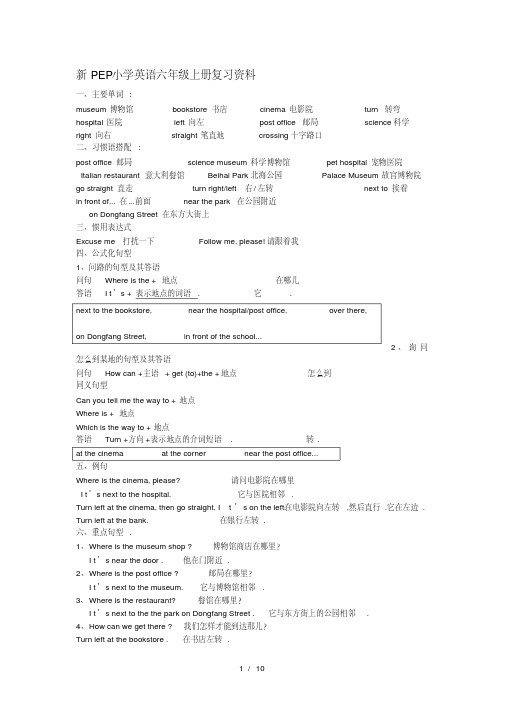
新PEP小学英语六年级上册复习资料一、主要单词:museum博物馆bookstore书店cinema电影院turn 转弯hospital医院left向左post office 邮局science科学right向右straight笔直地crossing十字路口二、习惯语搭配:post office邮局science museum科学博物馆pet hospital宠物医院Italian restaurant意大利餐馆Beihai Park北海公园Palace Museum故宫博物院go straight直走turn right/left右/左转next to挨着in front of...在...前面near the park 在公园附近on Dongfang Street在东方大街上三、惯用表达式Excuse me 打扰一下Follow me, please!请跟着我四、公式化句型1、问路的句型及其答语问句Where is the + 地点···在哪儿答语I t’s + 表示地点的词语. 它···.next to the bookstore, near the hospital/post office, over there,on Dongfang Street, in front of the school...2、询问怎么到某地的句型及其答语问句How can +主语+ get (to)+the +地点···怎么到···同义句型Can you tell me the way to +地点Where is + 地点Which is the way to +地点答语Turn +方向+表示地点的介词短语. ···转.at the cinema at the corner near the post office...五、例句Where is the cinema, please? 请问电影院在哪里I t’s next to the hospital. 它与医院相邻.Turn left at the cinema, then go straight. I t’s on the left. 在电影院向左转,然后直行.它在左边. Turn left at the bank. 在银行左转.六、重点句型.1、Where is the museum shop ? 博物馆商店在哪里?I t’s near the door . 他在门附近.2、Where is the post office ? 邮局在哪里?I t’s next to the museum. 它与博物馆相邻.3、Where is the restaurant? 餐馆在哪里?I t’s next to the the park on Dongfang Street . 它与东方街上的公园相邻.4、How can we get there ? 我们怎样才能到达那儿?Turn left at the bookstore . 在书店左转.Then turn right at the hospital .然后在医院右转.七、要知道的句子.1、I want to buy a postcard. 我想去买一张明信片.2、I want to send it today .今天我想把它寄出去.3、A talking robot .一个会讲话的机器人.4、What a great museum ! 好伟大的一个博物馆啊!5、What an interesting film ! 多么有趣的一部电影啊!Unit 2 Ways to go to school一、主要单词by乘bus公共汽车on foot步行plane飞机taxi出租车ship大船subway地铁train火车slow慢的stop停下always 总是一直usually 通常often经常sometimes 有时候never 从来不, 永不二、习惯语搭配by bike/bus/plane/subway/train/ship/taxi/ferry/sled /boat骑自行车/乘公共汽车/飞机/地铁/火车/船/出租汽车/渡轮take the No.57 bus乘57路公共汽车on foot步行slow down慢下来pay attention to注意traffic lights 交通信号灯look right向右看cross the road横穿马路get off下车at home在家traffic rules交通规则get to到达get on 上车be far from?表示离某地远三、惯用表达式Wait等一等Hooray太好了I see. 我明白了.Go at a green light 绿灯行Stop at a red light 红灯停Wait at a yellow light 黄灯等四、公式化句型1、如何询问对方的出行方式你们怎么来···的2、如何用must表示必须做某事某人+must+动词原形+其它. ···必须···.3、告诫别人不要做某事的句型Don’t +动词原形+其它. .不要/别···.五、例句How do you go to school? 你怎么去上学?Usually I go to school on foot. Sometimes I go by bus.通常我步行去上学.有时候骑自行车去.How can I get to Zhongshan Park ? 我怎么到达中山公园?You can go by the No. 15 bus. 同义句:You can take the No.15 bus.你可以坐15路公共汽车去.I am far from school now. 我现在离学校很远.My home is not far from our school. My home is near our school.我家离学校不远.六、重点句型:1、to school ? 你怎样来上学?2、Usually ,I3、Sometimes I4、I5、But I usually walk . 但是我通常步行.6、How can I get to the Fuxing Hospital ? 我怎样才能到达复兴医院?7、Take the No.57 bus over there . 在那边坐57路公交车.8、In the USA people on bikes must wear one (the helmet).在美国骑自行车的人们必须戴头盔9、Don’t go at the red light . 不要在红灯时走.(不要闯红灯.)10、I must pay attention to the traffic lights.我必须注意交通灯.11、How do you get to the USA from China ?怎样从中国到达美国?七、要知道的句子.1、You’re early . 你早啊.2、That’s good exercise . 那是好的锻炼方式.3、Hooray ! 万岁!4、I see .(I know.)我知道了6、You must look right before you cross the road .你过马路之前必须看右边.7、Let me read this for me . 让我为你读这吧.8、Let’s take a bus . 让我们乘公交吧.主题作文:My familyThere are three people in my family. They are my father, my mother, and I . I usually go to school on foot. My father usually goes to work by car. MY mother often goes to work by bike.On the weekend , I often go to the park by bike. My father often goes to the llibrary by bus. My mother often goes shopping . I often stop and wait at a red light. We must pay attention to the traffic lights.Unit 3 My weekend plan一、主要单词tomorrow明天film电影supermarket超市trip旅行tonight在今晚word单词post card明信片visit拜访二、习惯搭配take a trip去旅行go for a picnic去野餐go to the cinema去看电影learn to swim学习游泳visit my grandparents看望我外祖父母get together 聚会go to the supermarket去超市go ice-skating去滑冰make a snowman堆雪人see a film看电影make mooncakes做月饼read a poem朗诵一首诗get together= be together聚会have a big dinner吃大餐tell us a story 给我们讲故事this weekend这周末Renmin Park人民公园next week下周this morning/afternoon/evening今天上午/下午/晚上next Wednesday下星期三、惯用表达式What about you?你呢Here they are!它们在这儿Can I help you?我能帮助你吗Sounds great!听起来很棒Have a good time!玩得开心You too.你也是四、公式化句型1、询问对方打算做什么的句型及其答语问句What are you going to do +其它你/你们···打算做什么next week tonight tomorrow this morning/afternoon/evening this weekend...答语I’m/We’re going to +动词短语原形+其它. 我/我们打算···.see a film take a trip visit my grandparents watch TV...2、询问对方打算去哪儿的句型及答语问句Where are you going(+将来时间)? 你/你们打算···去哪儿答语I’m/We’re going (to the)+地点. 我/我们打算去···.3、询问对方打算何时去做某事的句型及答语问句When are you going to +动词短语原形你/你们打算什么时候···答语I’m/We’re going to +动词短语原形+将来时间. 我/我们打算···.五、例句What are you going to do on the weekend? 你周末打算做什么I’m going to visit my grandparents this weekend? 这个周末我打算去看望我的外祖父母. Where are you going this afternoon? 你今天下午打算去哪里I’m going to the bookstore. 我打算去书店.What are you going to buy? 你打算去买什么I’六、重点句型.1、What are you going to do tomorrow ? 明天你打算去干什么?I’m going to have an art lesson .我打算去上一节美术课.2、What are you going to do in your lesson ?在你们的课上你们打算去干什么?We’re are going to draw some pictures in Renmin Park !我们打算去人民公园画画.3、What are you going to do today ?今天你打算去干什么?I’m going to see a film . 我打算去看电影.4、Where are you going ?你们打算去哪里?We’re are going to the cinema .我们打算去看电影.We’re are going to see a film about space travel !我们打算去看一部关于太空旅行的电影.5、When are you going?你们打算什么时候去?Next Wednesday .下周三.七、要知道的句子.1、Sounds great! 听起来很棒!2、Have a good time ! 祝你玩的愉快!3、I have to do my homework now .我现在不得不做作业.4、I t’s half price then .那时它是半价.5、I ‘m going to buy some word books .我打算去买一些书.6、”F” is for family . F 代表家庭.主题作文:My family weekend planUnit 4 I have a pen pal一、主要单词studies学习(第三人称单数形式)puzzle谜hiking远足二、习惯搭配read(reads) stories读故事do(does) kungfu练功夫fly kites放风筝play(plays) the pipa弹琵琶play (plays) sports进行体育活动climb mountains爬山listen to music听音乐sing English songs唱英文歌on the playground在运动场上live( lives) in...住在···write an email to...给···写一封电子邮件on a farm在一个农场里三、惯用表达式Me too.我也是. Really?真的吗四、公式化句型1、询问某人爱好的句型及其答语问句What are sb.’s hobbies? ···有什么爱好答语主语+like/likes+动词-ing形式+其它. ···喜欢···.Singing dancing reading stories playing football doing kungfu doingword puzzles going hiking watching TV drawing cartoons listening to musicgoing fishing2、由do/does引导的一般疑问句及其答语问句Do/Does+主语+动词原形+其它答语Yes,主语+do/does. /No,主语+don’t/doesn’t.五、语法1、动词变为动名词的规则动词变为动名词即是动词加ing.一般要遵循以下三条规则(1)一般情况下在动词的后面直接加ing.如play—playing read—reading do—doing go—going(2)以不发音的字母e结尾的动词要去掉不发音的字母e再加ing.如write—writing ride—riding make—making dance—dancing(3)以单元音加单辅音结尾的重读闭音节要双写最后一个辅音字母再加ing.如run—running swim—swimming put—putting sit—sitting2、关于第三人称单数动词变为第三人称单数形式的规则(1)在一个句子中如果主语人称既不是你也不是我而是另外的一个人这时的人称叫做第三人称单数. (2)在第三人称单词的句子中动词要使用第三人称单词形式.(3)动词变为第三人称单数形式要遵循以下规则①一般情况下在动词的后面直接加s.如read--reads make—makes write—writes②以字母s, x, o , sh , ch结尾的动词在词尾加es.如do—does wash—washes teach—teaches go—goes pass—passes ③以y结尾的动词分为两个情况以元音字母加y结尾的动词在词尾直接加s.如play—plays buy--buys以辅音字母加y结尾的动词要把y变为i再加es.如study--studies④以f , fe结尾的名词先把f fe变为v,再加-es.⑤特殊变化have--has(4)在一个第三人称单数的句子中只要句子中出现了does或者其否定形式doesn’t.该句子中的其他动词就要使用原形.(5)第三人称单数的肯定句在变为否定句时在动词的前面加doesn’t. 动词恢复原形.如he lives in Beijing.---he doesn’t live in Beijing.(6) 第三人称单数的陈述句在变为一般疑问句时用does开头后面的动词也要变为原形.如he lives in Beijing.---Does he live in Beijing?3、注意几个单词的变化hobby(复数形式)—hobbies have to(同义词)—must六、反义词或对应词get on(上车)---get off(下车) near(近的)—far(远的) fast(快的)—slow(慢的) because(因为)—why(为什么) same(相同的)—different(不同的)here(这里)---there(那里) east(东)---west(西)north(北)---south(南) left(左)---right(右) get on (上车)---get off(下车)近义词see you---goodbye sure---certainly---of course七、重点句子.1、What are Peter’s hobbies?彼得的爱还是什么?He likes reading stories .他喜欢读故事.He likes doing kung fu and swimming .他喜欢打功夫和游泳.He also likes singing .他也喜欢唱歌.2、You like singing , too .你也喜欢唱歌.3、Does he live in Sydney ?他居住在悉尼么?No, he doesn’t .不;他不在.He lives in Canberra .他居住在堪培拉.4、Does he like doing word puzzles and going hiking ?他喜欢猜字谜和去远足么?Yes,he does .是的;他喜欢.八、要知道的句子.1、He lives on a farm ,so sometimes he reads to the cows .他居住在农场;因此他有时候给奶牛们读书.2、Good idea !好主意!3、What are you doing ? 你正在干什么?I’m writing an email to my new pen pal in Australia .我正在给我的澳大利亚的新笔友写电子邮件.Unit 5 What does he do?一、重点单词factory工厂worker工人postman邮递员police officer警察fisherman渔民scientist科学家pilot飞行员coach教练businessman商人企业家次重点单词:taxi driver 出租车司机cleaner 清洁工writer作家singer 歌手dancer 舞蹈者footplayer 足球运动员secretary秘书head teacher 校长reporter记者 a lion tamer 训狮员bee farmer 蜂农magician 魔术师二、习惯搭配by car/bus/bike/plane/boat乘小汽车/公共汽车/自行车/飞机/船go to work去上班study hard 努力学习work hard 努力工作lots of 许多go to the camp去度假营be good at...擅长···三、惯用表达式Cool!酷What about you?你呢That’s nice.那真好. I see.我明白了.四、公式化句型1、询问他人的职业的句型及其答语;问句What does+主语第三人称单数+do? ···是做什么的答语He/She is a /an+职业名称. 他/她是一位···.worker postman businessman fisherman scientist pilot coach police officer salesperson售货员cleaner清洁工teacher dancer舞蹈演员doctor nurse护士pianist钢琴家dentist牙医tailor裁缝2、询问他人的工作地点的句型及其答语问句Where does+主语第三人称单数+work···在哪儿工作答语He/She works+表示地点的介词短语. 他/她···工作.at a university in a gym at sea on a boat at the zoo3、询问他人的上班方式的问句及其答语问句How does +主语第三人称单数+go to work? ···怎么去上班答语He/She goes to work+交通方式. 他/她···去上班.by bike/bus/subway/plane/train/ship/ferry/...on foot五、一些由动词变化而来的职业名词teach—teacher clean—cleaner sing—singer dance—dancerdrive—driver write—writer TV report—TV reporter act—actoract—actress art—artist engine—engineer六、重点句型:1、What does he do? 他是做什么工作的?He’s a businessman . 他是一名商人.2、What does your mother do ? 你的妈妈是做什么工作的?She’s a head teacher .她是一名校长.3、Where does he work? 他在哪里工作?He works at sea .他在海上工作.4、How does he go to work ? 他怎样去上班?He works on a boat . 他在船上工作.He goes to work by bike .他骑自行车去上班.七、要知道的句子.1、Do you want to be a head teacher ,too ?你也想成为一名校长么?No, I want to be a businessman . 不;我想成为一名商人.2、Is your father a postman ? 你的爸爸是一名邮递员么?No , he isn’t . 不;他不是.3、He sees lots of fish every day ! 他每天都看到许多鱼.4、He has a very healthy life . 他有一个健康的生活.5、He works very hard and stays healthy . 他努力工作并保持健康.6、We should study hard and stay healthy ,too .我们也应该努力学习和保持健康.7、She works at/in a university .她在一所大学上班.主题作文:说说你父母的职业;上班地点和方式;和他们的爱好.My father is a doctor, He often goes to work by car.He works in a hospital. He likes reading books . My mother is an English teacher . She works in a school.She often goes to work on foot. She likes playing the piano. I am a student. I like doing kungfu. I often go to school on foot. I love them very much. How about you?Unit 6 How do you feel ?一、主要单词angry生气的afraid害怕worried担心的发愁的happy高兴的see a doctor看病more更多的wear穿deep深的breath呼吸名词count数数动词sad难过的次重点单词:tired 累的excited 兴奋的bored 无聊的well身体好的thirsty 口渴的dirty 脏的hungry 饿的full 饱的二、习惯搭配feel angry/ill/happy/sad/worried感觉生气/不舒服/高兴/难过/担心be afraid of...害怕···be angry with...(某人)与···生气take a deep breath深深吸一口气count to ten 数到十see a doctor看病do more exercise做更多的运动wear warm clothes穿暖和的衣服chase the mice追赶老鼠drink some drinks喝一些饮料have some popcorn吃一些爆米花make popcorn 制作爆米花三、惯用表达式Here you are.给你. Wait for me.等我一下. Yum!太美味了四、公式化句型1、描述某人/某物害怕什么的句型主语+be动词+afraid of +其他. ···害怕···.2、描述某人/某物与什么生气的句型主语+be动词+angry with+其他. ···与···生气.3、询问某人怎么了的句型及其答语问句What’s wrong? What’s the matter(with you)? 怎么了答语某人+所处的状况.4、建议某人应该做某事的句型某人+should +动词短语原形+其他. ···应该···.take a deep breath count to ten see a doctor do more exercise wear warm clothes...五、做“对句子划线部分提问”试题时一般应该遵循三个步骤1. 确定与句子划线部分相应的特殊疑问词并且特殊疑问词代替相应的划线部分.2. 把特殊疑问词代替划线部分后的句子变成一般疑问句.3. 最后再把特殊疑问词提到句首.以上三个基本步骤可以用三个字来概括即定问提.例如This is a book ?①This is what. ②Is this what ? ③What is this ?注意句①②只是一种变化过程不必写入试题中.句③才是试题所要求的形式和结果必须写到试题上.以上三个步骤是对句子划线部分提问最基本的过程.六、重点句型:1、What’s wrong(with +人)? 某人怎么了?Your father is ill . 你的爸爸生病了.He should see a doctor this morning . 他应该今天早上去看病.2、Don’t be sad . 不要难过.3、How does Dad feel now ? 爸爸现在感觉如何?Not well . 不好.4、How do you feel? 你感觉如何?I feel ……我感觉…..5、They’re afraid of him .他们害怕它(老鼠们).6、The cat is angry with them .猫很生它们(老鼠们)的气.7、Maybe our cat is chasing a mouse now ! 也许我们的猫现在正在追赶一只老鼠!8、Because the mice are bad .因为老鼠们都很坏.七、要知道的句子.1、What should I do ? 我应该做什么?You should +动词原形……你应该….2、What should he /she do ? 她/他应该做什么?He /She should ……主题作文:最近;同学们有的生病了;有的很容易生气;有的很发愁;有的不够强壮;还有的人发冷.你会分别给他们提出建议吗?要求语句通顺;意思连贯;不少于六句.Sam is ill. He should see a doctor. Lucy is angry . She should take a deep breath and count to ten. Tom is worried . He should talk with his parents . Tim is thin. He should do more exercise.Lily is cold. She should wear warm clothes.英语疑问词what,how,who,why,where,when的用法.一、what 什么用来问是什么叫什么做什么等1. What’s your name? 你叫什么名字2.What is in your box? 你的盒子里是什么3. What’s your father?=What does your father do? 你爸爸是干什么的(一)What time 什么时间用来问时间What time is it? 几点了(二)What colour 什么颜色用来问颜色What colour is your bag? 你的书包是什么颜色(三)What about 怎么样用来征求意见或询问感受等,大多用于承接上面的同样问题.1.What bout this pair of shoes? 这双鞋子怎么样2.What about you? 你呢3.What about your dad? 你爸爸呢(四) What day 星期几用来问星期几What day is it today/tomorrow? 今天/明天星期几(五)What date 什么日期问具体的日期1What’s the date today? 今天是几号 2. What date is tomorrow? 明天是几号(六)What ?for 为何目的用来问目的在一定情况下可以与why互换What did you buy that for?=Why did you buy that? 你为什么要买那个二、when 什么时候用来问时间When do you get up?你什么时候起床三、where 哪里用来问地点1. Where is my ruler? 我的尺子在哪里2. Where are you going to ? 你打算去哪里四、which 哪一个用来问具体的哪一个1. Which season do you like best? 你最喜欢哪个季节2.Which class are you in? 你在哪一个班3.Which one is my pen哪一支是我的钢笔五、Who 谁用来问人物是谁1.Who is that boy?那个男孩是谁2. Who are you going to with? 你打算和谁一起去3. Who is that pretty lady?那个漂亮的女士是谁六、whose 谁的用来问东西是谁的1. Whose bag is this? 这是谁的包2.Whose bike is yellow? 谁的自行车是黄色的七、why 为什么用来问原因1.Why do you like spring? 你为什么喜欢春天2. Why did you go there? 你为什么去那里八、how 怎么样用来询问身体等状况1. How are you? 你好吗2. How is your mother? 你妈妈好吗一How old 几岁用来问年龄How old are you? 你几岁了二How long 多长用来问长度How long are your legs? 你的腿多长三How big 多大用来问物体的大小How big is your bedroom? 你的卧室多大四How tall 多高用来问高度How tall is your brother? 你弟弟有多高五How heavy 多重用来问重量How heavy are you? 你有多重六How far 多远用来问路程 2 How far is it from here? 从这儿去有多远七How many 多少用来问数量How many apples do you have? 你有多少苹果八How much 多少钱用来问价格how much is this dress? 这个连衣裙多少钱九How about 怎么样用来征求意见或询问感受等大多用于承接上面的同样问题用法与what about相同1. How about you? 你呢2. How about that shirt? 那件衬衣怎么样。
pep小学英语六年级上册复习资料

pep小学英语六年级上册复习资料PEP小学英语六年级上册复习资料随着小学六年级上册英语学习的逐渐结束,孩子们即将迎来期末考试。
为了帮助孩子们更好地复习,本文将提供一些PEP小学英语六年级上册的复习资料,希望能对孩子们的学习有所帮助。
一、基础词汇复习在六年级上册的学习中,孩子们已经掌握了一定的英语词汇量。
在复习过程中,可以通过词汇卡片的方式进行记忆。
将单词写在卡片上,一面写英文,一面写中文,然后将卡片翻过来,通过读英文来回忆中文的意思。
可以通过这种方式来巩固词汇。
二、语法知识复习除了词汇外,语法知识也是英语学习中非常重要的一部分。
在复习过程中,可以通过做一些语法练习来加深对语法知识的理解。
例如,练习使用动词的不同时态,练习使用不同的句型结构等等。
通过这些练习,可以帮助孩子们更好地掌握语法知识。
三、听力训练在六年级上册的学习中,听力训练是非常重要的一环。
通过听力训练,可以提高孩子们的听力理解能力,帮助他们更好地理解英语的听力材料。
可以通过听录音并回答问题的方式来进行听力训练。
还可以通过听故事、听对话等方式来提高听力技巧。
四、口语练习口语练习是英语学习中非常关键的一环。
通过口语练习,可以提高孩子们的口语表达能力,培养他们的英语口语思维。
可以通过角色扮演、对话练习等方式来进行口语练习。
还可以通过与同学或老师进行英语对话来提高口语水平。
五、阅读理解阅读理解是英语学习中非常重要的一项技能。
通过阅读理解练习,可以帮助孩子们提高阅读理解能力,培养他们的阅读习惯。
可以通过阅读短文并回答问题的方式来进行阅读理解练习。
还可以通过阅读故事、文章等来提高阅读理解能力。
六、写作训练写作是英语学习中培养孩子们语言表达能力的重要环节。
通过写作训练,可以提高孩子们的写作能力,培养他们的写作思维。
可以通过写日记、写作文等方式来进行写作训练。
还可以通过与同学或老师进行英语写作交流来提高写作水平。
以上是对PEP小学英语六年级上册的复习资料的介绍。
最新人教版(PEP)小学英语六年级上册复习资料

最新人教版(PEP)小学英语六年级上册复习资料Unit 1 How Can I Get There?In this unit。
we will learn some XXX.1.Key Vocabulary:museum: a place where you can see art。
historical objects。
or XXXbookstore: a shop where you can buy bookscinema: a place where you can watch moviesturn: to change nhospital: a place where you can receive medical treatmentleft: the opposite of rightpost office: a place where you can send and receive letters and packagesscience: the study of the natural worldright: the opposite of leftstraight: in a direct linecrossing: a place where two or more roads meeteful Phrases:post office: the place where you can send and receive letters and packagesscience museum: a museum where you can learn about scienceXXX animalsXXX: XXX foodXXX: a park in BeijingPalace Museum: a museum in Beijinggo straight: XXXturn right/left: to change n to the right or leftnext to: beside or near somethingin front of: located before or ahead of somethingnear the park: close to the parkXXX: XXXmon ns:Excuse me: a polite way to get someone's nFollow me。
新版人教PEP 小学英语六年级上册期中测试 重点知识整理
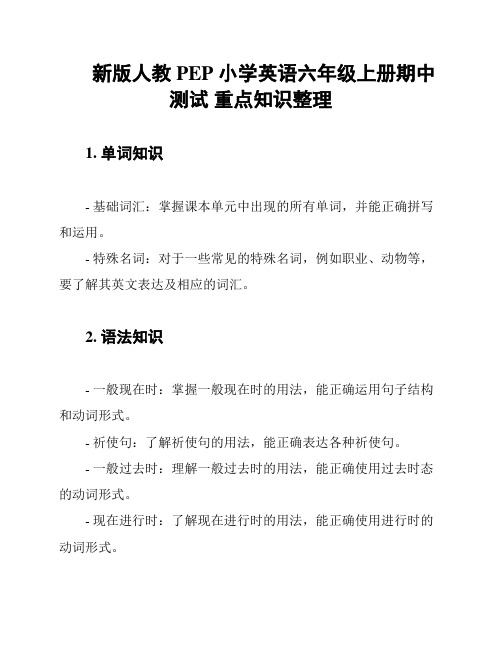
新版人教PEP 小学英语六年级上册期中
测试重点知识整理
1. 单词知识
- 基础词汇:掌握课本单元中出现的所有单词,并能正确拼写和运用。
- 特殊名词:对于一些常见的特殊名词,例如职业、动物等,要了解其英文表达及相应的词汇。
2. 语法知识
- 一般现在时:掌握一般现在时的用法,能正确运用句子结构和动词形式。
- 祈使句:了解祈使句的用法,能正确表达各种祈使句。
- 一般过去时:理解一般过去时的用法,能正确使用过去时态的动词形式。
- 现在进行时:了解现在进行时的用法,能正确使用进行时的动词形式。
3. 句型结构
- 肯定句:能正确构造肯定句,使句子结构完整、通顺。
- 否定句:了解否定句的构成方式,能正确运用否定形式构造句子。
- 一般疑问句:了解一般疑问句的结构,能正确构造疑问句并作出回答。
4. 阅读理解
- 阅读短文:能够理解短文的大意,获取文中的关键信息。
- 理解问题:能够根据所读短文回答相关问题,理解问题的要点并给出准确答案。
以上是本学期上册期中测试的重点知识整理,希望大家能认真复习并加强强化练习,取得优异的成绩。
加油!。
PEP六年级上册英语复习资料大全

PEP六年级上册英语复习资料大全六年级是小学英语复习的重要阶段,为帮助同学们更好复习,为大家分享小学六年级英语复习重点资料如下,一起来看看吧!重点:when 什么时候 where哪里 what什么 who 谁 how 怎样 why 为什么 which 哪一个例子:1.—How can I get to the zoo? 我怎样去动物园?--You can ride a bike there. 你可以骑自行车去那里。
2.—Why do you go to school on foot? 为什么你走路去学校?--Because my home is near. 因为我的家比较近。
3.—Where are you going after lunch? 中饭后你打算去哪里?--I’m going to the bookstore. 我打算去书店。
4.—When are you going? 你什么时候去?--I’m going at 4 o’clock. 我4点钟去。
5.—What are you going to do? 你打算去做什么?--I’m going to play football. 我打算去踢球。
6.—Who are you going to play with? 你打算和谁一起玩?--I’m going to play with Tom. 我打算和TOM一起玩。
7.—Which season do you like best? 你最喜欢哪个季节?--I like spring best. 我最喜欢春天。
单词:Unit 1on foot(走路) by bike(骑自行车) by bus(乘公共汽车) by train(乘火车) by plane乘飞机 by ship乘轮船 by subway乘地铁 how(怎样) go to school(上学) traffic(交通) traffic light(交通灯) traffic rule(交通规则)bus stop(停车站) wait(等待) stop 停 get to(到达)Unit 2library(图书馆) post office(邮局) hospital(医院) cinema(电影院) bookstore(书店) science museum科学博物馆 supermarket超级市场 bank 银行 excuse me 对不起where(在哪里,到哪里) please(请) next to(与…相邻) turn right (向右转) turn left(向左转) go straight(笔直走) north 北 south 南 east 东 west 西 then (然后)Unit 3today 今天 tomorrow明天 tonight今晚 weekend 周末 next week(下周) this morning(今天上午) this afternoon(今天下午) this evening (今天晚上) take a trip去旅行read a magazine读杂志 go to the cinema 去电影院 visit grandparents看望祖父母 play sports 做运动 read books读书 clean my room 打扫房间 theme park 主题公园 the Great Wall 长城 comic book(漫画书) post card(明信片) newspaper(报纸) magazine杂志dictionary字典 buy(购买)Unit 4hobby(爱好) ride --riding a bike(骑自行车) dive--diving(跳水) play —playing the violin(拉小提琴) make—making kites(制作风筝) collect—collecting stamps(集邮) live –lives(居住) teach--teaches(教) go--goes(去) watch--watches(看) read--reads(读,看)Unit 5singer(歌唱家,歌手) writer(作家) actor(男演员) actress(女演员) artist(画家) TV reporter(电视台记者) student学生 teacher 教师 dancer 舞者 doctor 医生 nurse护士driver司机 farmer农民 engineer(工程师) accountant(会计) policeman(男警察) salesperson(销售员) cleaner(清洁工) work(工作)Unit 6rain(雨) cloud (云) sun(太阳) stream(河,溪) vapour水蒸气 come from(来自,从…来) seed(种子) soil(土壤) sprout (苗,芽) plant(植物,种植)句子:1.--How do you go to school? 你怎样去学校的?--My home is near. Usually I go to school on foot. Sometimes I go by bike.我的家很近。
pep小学英语六年级上册复习资料
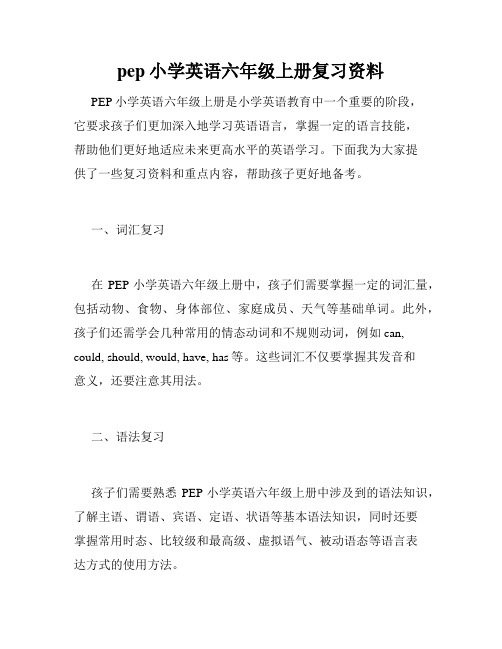
pep小学英语六年级上册复习资料PEP小学英语六年级上册是小学英语教育中一个重要的阶段,它要求孩子们更加深入地学习英语语言,掌握一定的语言技能,帮助他们更好地适应未来更高水平的英语学习。
下面我为大家提供了一些复习资料和重点内容,帮助孩子更好地备考。
一、词汇复习在PEP小学英语六年级上册中,孩子们需要掌握一定的词汇量,包括动物、食物、身体部位、家庭成员、天气等基础单词。
此外,孩子们还需学会几种常用的情态动词和不规则动词,例如can, could, should, would, have, has等。
这些词汇不仅要掌握其发音和意义,还要注意其用法。
二、语法复习孩子们需要熟悉PEP小学英语六年级上册中涉及到的语法知识,了解主语、谓语、宾语、定语、状语等基本语法知识,同时还要掌握常用时态、比较级和最高级、虚拟语气、被动语态等语言表达方式的使用方法。
三、对话和情景练习在PEP小学英语六年级上册中,孩子们需要掌握一些对话和情景练习。
这些练习内容常涉及到生活中实用的话题,如问路、打电话、约会、购物、旅游等。
家长可以和孩子一起完成这些对话和情景练习,帮助孩子提高英语口语水平,尤其是在表达能力和流畅度方面。
四、阅读练习阅读练习在PEP小学英语六年级上册中也占有重要的地位。
孩子们需要通过阅读,学习一些常用的语言表达方式,词汇和句型等。
家长可以配合孩子一起读一些英语原版故事书籍或者阅读一些简单的英文文章,让孩子在阅读中更好地掌握英语知识。
五、公开演讲和英语活动在学习PEP小学英语六年级上册过程中,家长还可以组织孩子们参加一些英语活动和公开演讲。
这种方式可以有效提高孩子们的英语自信心和口语表达能力,同时也能让孩子们更好地体会到英语带来的乐趣和好处。
六、语言环境和实践家长可以尝试在家中营造一个更适合英语学习的语言环境,例如放置一些英语书籍、杂志、音乐或者电影,同时可以组织家庭外出旅游或者观光,给孩子提供一个更好的英语学习实践机会。
xx年新版PEP小学六年级英语上册复习资料(精华版)
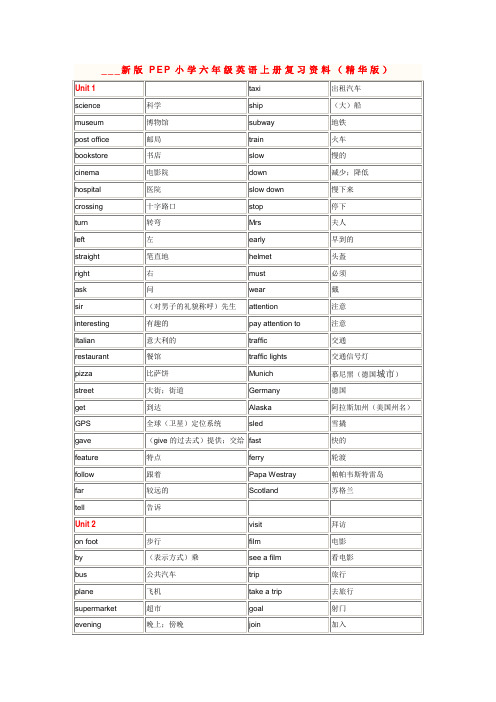
Unit1 How Do You Go There? (你怎样去那里?)重点单词:on foot= walk走路by bike骑自行车by bus坐公车by train坐火车by plane坐飞机by ship坐轮船by subway坐地铁near近的far远的usually通常sometimes有时候easy简单的the fifth floor第五层楼traffic lights交通灯traffic rules交通规则stop停止wait等待get to到达same相同的mean意思是driver司机right 右边left左边must必须know知道重点句子:1. How do you go to school? 你是怎样去上学的?2. I go to school by bus.我是坐公交车去上学的。
3. Usually I go to school on foot. 我通常走路去上学。
4. Sometimes I go by bike. 有时候我骑自行车去。
、5. My home is near/ far. 我的家是近的。
/ 远的。
6. Look at the traffic lights, remember the traffic rules. 看着交通灯,记住交通规则。
7. Stop at a red light. Wait at a yellow light. Go at a green light. 红灯停。
黄灯等一等。
绿灯行。
8. Red means stop, yellow means wait, green means go. 红色的意思是停止,黄色的意思是等待,绿色的意思是通行。
9. How can I get to the park? 我该怎样到达公园呢?10. You can go by the No. 15 bus. 你可以坐15路公交车去。
知识点:1、There are many ways to go somewhere.到一个地方去有许多方法。
最新PEP小学英语六年级上册复习资料

PEP小学英语六年级上册复习资料一、八个疑问词where(哪里) how(如何)what(什么)when(什么时候)which(哪一个)who(谁) whose(谁的)why(为什么)背诵本学期学过的句子:◆Where is the cinema, please? It’s next to the hospital. ---- 问地点Where is your home? My home is near the post office.Where are you going this afternoon? I am going to the bookstore.WWhere are you going? I am going to the sky.◆How do you go to school? I go to school by bike. -----问交通方式How do you go to Canada? I go by plane.How can I get to Zhongshan Park? You can go by the No.15 bus. -----问路How can I get to the museum? Go straight for five minutes. Then turn left.How do you do that? ----问种植◆What are you going to do this evening? ----- 问做什么I am going to the cinemaWhat are you going to do on the weekend?I am going to visit my grandparents this weekend.What are you going to do after school?I am going to buy a pair of shoes in the shoestore.What is your hobby? I like collecting stamps. --------问喜好What does your mother do? She is a TV reporter. ------问职业What should do you then? ------- 问种植◆When are you going? I am going at 2 o’clock. -----问时间◆Who are you? I am little water drop. ----问谁◆Which floor? The fifth floor, Room 5A. ----问哪一层二、单词分类交通方式:by bus, by train, by subway, by ship, by plane, by car, on foot文具书籍:dictionaryst card职业:singer, writer, TV reporter, actor, actress, engineer, accountant, salesperson, policeman, policewoman,artist, cleanerV-ing形式:riding a bike, collecting stamps, diving, making kites, playing the violin 第三人称单数形式:lives,teaches, watches, goes, does, doesn’t公共场所:library,post office, cinema, hospital, science museum, bookstore方位:east, west, south, north, turn left, turn right, go straight交通灯; red light, yellow light, green light自然:sun, cloud, rain, vapour, stream种植:seed, soil, sprout, plant三、不定冠词a和an 的用法a 用于辅音因素开头的单词前,an用于元音因素开头的因素前如:a singer, a writer, a policeman ,a salesperson记住本学期出现过的用an 的单词:an actor , an actress, an English book, an artist, an accountant, an engineer, an orange, an old woman四、人称代词和物主代词I(我)—my(我的)you(你)—your(你们的)we(我们)—our(我们的)he(他)—his (他的)she(她)—her(她的)it(它)—its(它的)they(他们,她们,它们)—their(他们的,她们的,它们的)五、介词的用法ually I go to school on foot, sometimes I go by bike.2.Wait for the sprout. Wait for the flower to grow.3.See you at two o’clock.4.Go straight for five minutes. Then turn left.5.It on the left.6.Get on/ off at the post office.六、用动词的适当形式填空1.like或者likes后面直接跟动词的ing形式I like making kites.He likes collecting stamps.2.want to 跟动词原形I want to buy an English book in the bookstore.I want to be a science teacher one day.3.can后跟动词原形She can play the violin.I can play basketball.4.be going to 后跟动词原形(不要管是什么人称)What are you going to do on the weekend?I am going to visit my grandparents this weekend.John is going to buy a pair of shoes in the shoe store.We are going to have a picnic next week.5. 第三人称单数形式加s 或es(动词第三人称单数形式一般直接加s, 以ch,sh,s,x,o等结尾的加es, 以辅音字母加y结尾的变y为i再加es,如studies;特殊变化have 变has ) She cleans streets. He helps sick people.She reads newspaper every day.---------------------------------------------------He watches TV at home. He goes to work by subway.He is a teacher. He teaches English. My pen pal lives in Beijing.He studies hard.(他努力学习)She has a happy family. (她有一个快乐的家庭)6. 肯定回答,否定回答Is there ……? Yes, there is. / No, there isn’t.Does he ……? Yes, he does. / No, he doesn’t. Does s he ……? Yes, she does. / No, she doesn’t.。
新版PEP六年级上册英语期末复习知识点汇总(新)

六年级PEP上册总复习资料Name______Class_____Unit 1 How can I get there?词汇library 图书馆post office 邮局hospital 医院 turn left 左转 turn right 右转places: cinema 电影院( 地点) bookstore 书店science museum科学博物馆 go straight 直行 crossing 十字路口pet hospital 宠物医院school 学校supermarket 超市shoe store 鞋店Italian restaurant 意大利餐馆问路的重点句型:1.Where is the cinema, please? 请问电影院在哪儿?next to the bookstore 紧挨着书店in front of the school. 在学校的前面.behind the park 在公园的后面It’s near the zoo. 在动物园的附近.on D ongfang S treet 在东方大街上over there 在那边2. Excuse me, is there a cinema near here ?请问这附近有电影院吗?Yes, there is. /No,there isn’t. 有./没有。
3. How can I get to the hospital? 我该怎样到达医院呢?How can I / we get there?我/ 我们怎样到那?回答: Turn right/ left at the … 在… 地方向右/ 左转.或 Go straight 向前直走.或 You can take the No.31 bus. 你可乘坐31路公交车去。
4. Is it far from here? 离这儿远吗?Yes, it is. / No, it isn’t.是的,很远/ 不是很远。
pep六年级英语上册复习资料
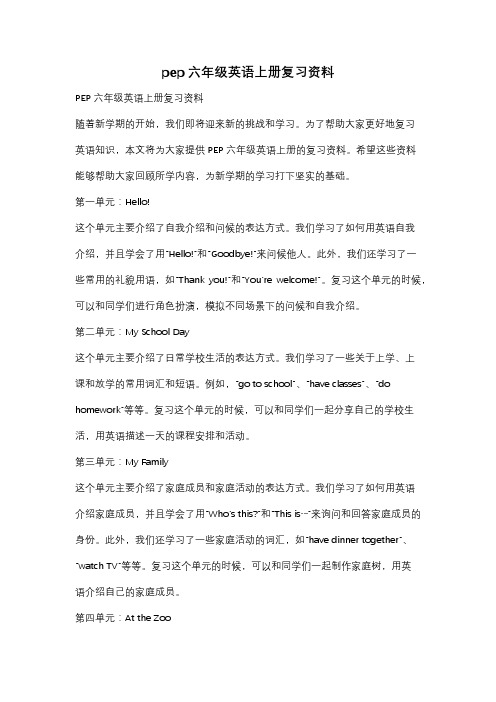
pep六年级英语上册复习资料PEP六年级英语上册复习资料随着新学期的开始,我们即将迎来新的挑战和学习。
为了帮助大家更好地复习英语知识,本文将为大家提供PEP六年级英语上册的复习资料。
希望这些资料能够帮助大家回顾所学内容,为新学期的学习打下坚实的基础。
第一单元:Hello!这个单元主要介绍了自我介绍和问候的表达方式。
我们学习了如何用英语自我介绍,并且学会了用“Hello!”和“Goodbye!”来问候他人。
此外,我们还学习了一些常用的礼貌用语,如“Thank you!”和“You're welcome!”。
复习这个单元的时候,可以和同学们进行角色扮演,模拟不同场景下的问候和自我介绍。
第二单元:My School Day这个单元主要介绍了日常学校生活的表达方式。
我们学习了一些关于上学、上课和放学的常用词汇和短语。
例如,“go to school”、“have classes”、“do homework”等等。
复习这个单元的时候,可以和同学们一起分享自己的学校生活,用英语描述一天的课程安排和活动。
第三单元:My Family这个单元主要介绍了家庭成员和家庭活动的表达方式。
我们学习了如何用英语介绍家庭成员,并且学会了用“Who's this?”和“This is…”来询问和回答家庭成员的身份。
此外,我们还学习了一些家庭活动的词汇,如“have dinner together”、“watch TV”等等。
复习这个单元的时候,可以和同学们一起制作家庭树,用英语介绍自己的家庭成员。
第四单元:At the Zoo这个单元主要介绍了动物和动物园的表达方式。
我们学习了一些常见动物的英文名称,并且学会了用“Can you see…?”和“Yes, I can.”来询问和回答是否能看到某个动物。
此外,我们还学习了一些动物园的词汇,如“lion”、“tiger”、“elephant”等等。
复习这个单元的时候,可以和同学们一起玩动物猜谜游戏,用英语描述动物的特征,让其他同学猜出是哪种动物。
pep六年级英语上册复习资料
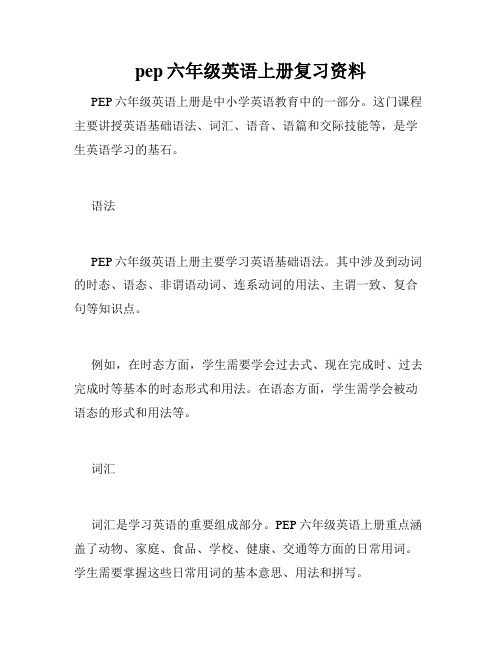
pep六年级英语上册复习资料PEP六年级英语上册是中小学英语教育中的一部分。
这门课程主要讲授英语基础语法、词汇、语音、语篇和交际技能等,是学生英语学习的基石。
语法PEP六年级英语上册主要学习英语基础语法。
其中涉及到动词的时态、语态、非谓语动词、连系动词的用法、主谓一致、复合句等知识点。
例如,在时态方面,学生需要学会过去式、现在完成时、过去完成时等基本的时态形式和用法。
在语态方面,学生需学会被动语态的形式和用法等。
词汇词汇是学习英语的重要组成部分。
PEP六年级英语上册重点涵盖了动物、家庭、食品、学校、健康、交通等方面的日常用词。
学生需要掌握这些日常用词的基本意思、用法和拼写。
此外,PEP六年级英语上册还会出现一些常见的英语习惯用语和固定短语,如“Thank you”、“Let me see”、“How about”等,学生也需要熟记这些习惯用语并掌握其用法。
语音语音方面的考查主要涉及到英语单词发音和英语语音的基本规则。
例如,学生需要学会如何正确地发音,区分不同音素之间的发音细节。
此外,为了更好地掌握英语语音规则,学生还需掌握英语语音变化的规则,如“元音字母的长短区别”、“辅音字母的音变规律”等。
语篇语篇主要指英语阅读和写作技能。
PEP六年级英语上册要求学生阅读和理解故事、简单的说明文、对话等,同时鼓励学生学会按照主题和时间的顺序整理并写出日记、便条、信件等。
交际技能交际技能在英语学习中同样重要。
PEP六年级英语上册注重学生的口语表达能力,学习如何正确地使用英语与他人进行交际。
例如,学生要学会如何用英语正确、清晰地介绍自己的基本信息,如姓名、年龄、学校、家庭等,还需要学习如何用英语表达自己的意见、喜好、计划等。
总体而言,PEP六年级英语上册的学习是英语学习的一次重要机会,学生应该积极参与课堂学习,并在课余时间做好复习与巩固。
只有在认真学习和广泛练习的基础上,才能真正掌握英语的基础知识和技能。
- 1、下载文档前请自行甄别文档内容的完整性,平台不提供额外的编辑、内容补充、找答案等附加服务。
- 2、"仅部分预览"的文档,不可在线预览部分如存在完整性等问题,可反馈申请退款(可完整预览的文档不适用该条件!)。
- 3、如文档侵犯您的权益,请联系客服反馈,我们会尽快为您处理(人工客服工作时间:9:00-18:30)。
人教版(PEP)小学英语总复习六年级上册知识点Unit 1How can I get there ?一、主要单词:museum 博物馆 bookstore 书店 cinema 电影院 turn 转弯 hospital 医院 left 向左 post office 邮局 science 科学 right 向右 straight 笔直地 crossing 十字路口 二、习惯语搭配:post office 邮局 science museum 科学博物馆 pet hospital 宠物医院 I talian restaurant 意大利餐馆 Beihai Park 北海公园 Palace Museum 故宫博物院go straight 直走 turn right/left 右/左转 next to 挨着 in front of...在...前面 near the park 在公园附近 on Dongfang Street 在东方大街上Excuse me 打扰一下Follow me, please!1Where is the +I t ’s + 表示地点的词语。
它···。
2How can +主语 + get (to)+the +Can you tell me the way to +Where is +Which is the way to +Turn +方向+表示地点的介词短语。
···转。
Where is the cinema, please?I t’s next to the hospital. 它与医院相邻。
Turn left at the cinema, then go straight. I t’s on the left. 在电影院向左转,然后直行。
它在左边。
Turn left at the bank. 在银行左转。
六、重点句型。
1、Where is the museum shop ? 博物馆商店在哪里?I t’s near the door . 他在门附近。
2、Where is the post office ? 邮局在哪里?I t’s next to the museum. 它与博物馆相邻。
3、Where is the restaurant? 餐馆在哪里?I t’s next to the the park on Dongfang Street . 它与东方街上的公园相邻。
4、How can we get there ? 我们怎样才能到达那儿?Turn left at the bookstore . 在书店左转。
Then turn right at the hospital .然后在医院右转。
七、要知道的句子。
1、I want to buy a postcard. 我想去买一张明信片。
2、I want to send it today .今天我想把它寄出去。
3、A talking robot .一个会讲话的机器人。
4、What a great museum ! 好伟大的一个博物馆啊!5、What an interesting film ! 多么有趣的一部电影啊!Unit 2 Ways to go to schoolby乘bus公共汽车on foot步行plane飞机taxi出租车ship subway地铁train火车slow慢的stop停下always usually 通常often经常sometimes 有时候never 从来不, 永不by bike/bus/plane/subway/train/ship/taxi/ferry/sled /boat骑自行车/乘公共汽车/飞机/地铁/火车/船/出租汽车/渡轮take the No.57 bus乘57路公共汽车on foot步行slow down慢下来pay attention to注意traffic lights 交通信号灯look right向右看cross the road横穿马路get off下车at home在家traffic rules交通规则get to到达get on 上车be far from?表示离某地远Wait Hooray I see. 我明白了。
Go at a green light 绿灯行Stop at a red light 红灯停Wait at a yellow light 黄灯等1How do you come(to)+2、如何用must某人+must++. ···必须···。
3、告诫别人不Don’t ++. .不要/别···。
How do you go to school? 你怎么去上学?Usually I go to school on foot. Sometimes I go by bus.通常我步行去上学。
有时候骑自行车去。
How can I get to Zhongshan Park ?You can go by the No. 15 bus. 同义句:You can take the No.15 bus.你可以坐15路公共汽车去。
I am far from school now. 我现在离学校很远。
My home is not far from our school. My home is near our school.我家离学校不远。
六、重点句型:1、How do you come to school ? 你怎样来上学?2、Usually ,I come on foot . 通常,我步行来。
3、Sometimes I come by bus . 有时候我坐公交来。
4、I often come by bike . 我经常骑车来。
5、But I usually walk . 但是我通常步行。
6、How can I get to the Fuxing Hospital ? 我怎样才能到达复兴医院?7、Take the No.57 bus over there . 在那边坐57路公交车。
8、In the USA people on bikes must wear one (the helmet).在美国骑自行车的人们必须戴头盔9、Don’t go at the red light . 不要在红灯时走。
(不要闯红灯。
)10、I must pay attention to the traffic lights.我必须注意交通灯。
11、How do you get to the USA from China ?怎样从中国到达美国?七、要知道的句子。
1、You’re early . 你早啊。
2、That’s good exercise . 那是好的锻炼方式。
3、Hooray ! 万岁!4、I see .(I know.)我知道了5、The bus is coming . 公交车来了。
6、You must look right before you cross the road .你过马路之前必须看右边。
7、Let me read this for me . 让我为你读这吧。
8、Let’s take a bus . 让我们乘公交吧。
主题作文:My familyThere are three people in my family. They are my father, my mother, and I . I usually go to school on foot. My father usually goes to work by car. MY mother often goes to work by bike. On the weekend , I often go to the park by bike. My father often goes to the llibrary by bus. My mother often goes shopping . I often stop and wait at a red light. We must pay attention to the traffic lights.Unit 3 My weekend plantomorrow明天film电影supermarket超市trip旅行tonight在今晚evening晚上/傍晚next week下周comic连环画杂志dictionary词典word单词post card明信片visit拜访take a trip去旅行go for a picnic去野餐go to the cinema去看电影learn to swim学习游泳visit my grandparents get together 聚会go to the supermarket去超市go ice-skating去滑冰make a snowman堆雪人see a film看电影make mooncakes做月饼read a poem朗诵一首诗get together= be together聚会have a big dinner吃大餐tell us a story 给我们讲故事this weekend这周末Renmin Park人民公园next week下周this morning/afternoon/evening今天上午/下午/晚上next Wednesday下星期三、惯用表达式What about you?Here they are!Can I help you?Sounds great!Have a good time!You too.你也是1What are you going to do +其它你/I’m/We’re going to ++其它. 我/我们打算···。
see a film take a trip visit my grandparents watch TV...2Where are you going(+将来时间)? 你/I’m/We’re going (to the)+地点. 我/我们打算去···。
3When are you going to +你/I’m/We’re going to ++将来时间. 我/我们打算···。
What are you going to do on the weekend?I’m going to visit my grandparents this weekend? 这个周末我打算去看望我的外祖父母。
